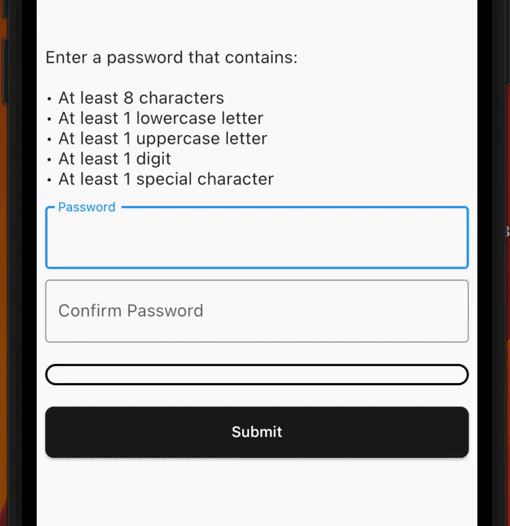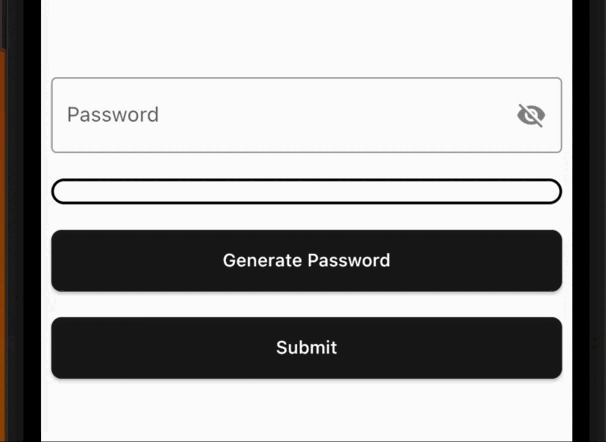Generate secure passwords, check for exposed passwords, get visual feedback for password strength or get form validation with a minimum password strength required.
Check the strength of the password in a visual way, with an animation when the strength changes according to the settings given by the user.
Use it also inside a Form to get form validation!
- Check for exposed common password using the
commonDictionary, a map with 10,000 leaked passwords! - Use the
PasswordStrengthCheckerto have a visual feedback. - Use the
PasswordStrengthFormCheckerto have a built-inTextFormFieldinside the widget and get form validation using aminimumStrengthRequired. - Use the
PasswordGeneratorclass to generate a secure random password based on the input configurations (PasswordGeneratorConfiguration). - Create your custom strength to create your own rules or use the
PasswordStrengthdefault enum (see Custom Strength).
You can use the PasswordStrengthChecker to only have a visual feedback, for example:
final passNotifier = ValueNotifier<PasswordStrength?>(null);
// ...
PasswordStrengthChecker(
strength: passNotifier,
),See the full example here.
You can use the PasswordStrengthFormChecker to have a built-in TextFormField inside the widget and get form validation using a minimumStrengthRequired. For example:
PasswordStrengthFormChecker(
minimumStrengthRequired: PasswordStrength.secure,
onChanged: (password, notifier) {
notifier.value = PasswordStrength.calculate(text: password);
},
),See the full example here.
You can use the PasswordGeneratorclass to generate a secure random password based on the configurations. For example:
final config = PasswordGeneratorConfiguration(
length: 32,
minUppercase: 8,
minSpecialChars: 8,
// ...
);
final passwordGenerator = PasswordGenerator.fromConfig(
configuration: config,
);
final password = passwordGenerator.generate();See the full example here.
You can use the default PasswordStrength enum to set the strength of the password, or you can create your own enum that implements PasswordStrengthItem and use it. For example:
enum CustomPassStrength implements PasswordStrengthItem {
weak,
medium,
strong;
@override
Color get statusColor {
switch (this) {
case CustomPassStrength.weak:
return Colors.red;
case CustomPassStrength.medium:
return Colors.orange;
case CustomPassStrength.strong:
return Colors.green;
}
}
@override
Widget? get statusWidget {
switch (this) {
case CustomPassStrength.weak:
return const Text('Weak');
case CustomPassStrength.medium:
return const Text('Medium');
case CustomPassStrength.strong:
return const Text('Strong');
default:
return null;
}
}
@override
double get widthPerc {
switch (this) {
case CustomPassStrength.weak:
return 0.15;
case CustomPassStrength.medium:
return 0.4;
case CustomPassStrength.strong:
return 0.75;
default:
return 0.0;
}
}
static CustomPassStrength? calculate({required String text}) {
// Implement your custom logic here
if (text.isEmpty) {
return null;
}
// Use the [commonDictionary] to see if a password
// is in 10,000 common exposed password list.
if (commonDictionary[text] == true) {
return CustomPassStrength.weak;
}
if (text.length < 6) {
return CustomPassStrength.weak;
} else if (text.length < 10) {
return CustomPassStrength.medium;
} else {
return CustomPassStrength.strong;
}
}
}The project is open source and you can contribute to it here -> repository link
- If you found a bug, open an issue.
- If you have a feature request, open an issue.
- If you want to contribute, submit a pull request.
Made with ❤️ from dariowskii












